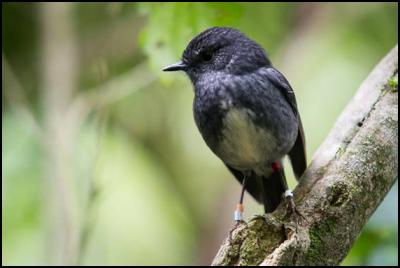Little birds make big decisions
MEDIA RELEASE
24 June 2013
Little birds make big decisions
Research carried out at Victoria University into New Zealand’s North Island robin has uncovered a remarkable ability to recognise different human beings.
In the first study of its kind, researchers in Victoria’s School of Biological Sciences found that not only are some North Island robins (Petroica longipes), or toutouwai, able to recognise different people, their differing reaction to humans may lie in the bird’s individual behavioural type.
Dr Craig Barnett, who is currently based in Japan, led the research which took place over a period of three months at the Zealandia ecosanctuary.
Using a simple feeding experiment with mealworms as a food source, Dr Barnett and his colleagues timed how long it took the robins to attack food placed nearby to a person.
“For seven days, the same person dressed in a white lab coat stood near the food source,” says Dr Barnett.
“On the eighth day, a different person, this time wearing a blue coat, stood near the food source.
“We split the birds into two groups: ‘fast’ or ‘slow’ attackers, depending on their average attack times.
“Interestingly, the results showed that the attack times of the faster, bolder birds didn’t change much when the new human appeared. However, the slower birds, which were more cautious around humans, displayed even longer attack times when the new person arrived on the eighth day.”
He believes the key to the differences lie in there being distinct personalities among the bird population and says the findings have important implications for conservation efforts.
“Some birds were clearly oblivious to the differences in people, while other birds paid more attention.
“Behavioural differences could play an important role in programmes to shift and manage bird populations, because, for example, if we removed too many ‘bold’ individuals from a population and created a new ‘risk-averse’ population, they may not thrive due to a greater lack of caution around predators.”
Dr Kevin Burns, a New Zealand natural history expert based in Victoria’s School of Biological Sciences, says the research sheds new light on the personality traits of birds.
“North Island robins are an interesting species because although they are capable of quite complex cognitive tasks, such as counting, they have so far failed to adapt to urban environments,” he says.
“While individuals in
other bird and animal species have been shown to be able to
recognise individual humans, this is the first instance
where it has been shown that different behavioural types
within a species might perform a task
differently.
“This new information could assist with
conservation efforts in other island nations, for example
Hawaii, which are also working towards protecting and
preserving endemic wildlife,” says Dr Burns.
Although North Island robins are not endangered, they are vulnerable to predators as they feed on the ground and their nests are easily accessible. Along with the population at Zealandia, they can be found in forests of the western and central North Island, and on Little Barrier and Kapiti Islands.
Dr Barnett’s research has been published through the open access science journal PLOS ONE and can be read in its entirety here.

Image: A North Island robin at Zealandia, courtesy of Brendon Doran
ENDS


 Crohn's and Colitis NZ: Camp Purple Live 2025 - Celebrating A Decade Of Fun And Friendship For Kids And Teens With Inflammatory Bowel Disease
Crohn's and Colitis NZ: Camp Purple Live 2025 - Celebrating A Decade Of Fun And Friendship For Kids And Teens With Inflammatory Bowel Disease Creative Waikato: Building Wellbeing In Social Housing Through Creative Solutions
Creative Waikato: Building Wellbeing In Social Housing Through Creative Solutions The Conversation: ‘Cold Violence’ – A Hidden Form Of Elder Abuse In New Zealand’s Chinese Community
The Conversation: ‘Cold Violence’ – A Hidden Form Of Elder Abuse In New Zealand’s Chinese Community Sport Manawatu: Nominations Open For The 2025 Tararua Sports Awards
Sport Manawatu: Nominations Open For The 2025 Tararua Sports Awards PHCC: Not All Upcycled Food Is Created Equal - What Is Sustainable?
PHCC: Not All Upcycled Food Is Created Equal - What Is Sustainable? Prostate Cancer Foundation: Foundation Hails Select Committee Support For Prostate Screening Pilots
Prostate Cancer Foundation: Foundation Hails Select Committee Support For Prostate Screening Pilots